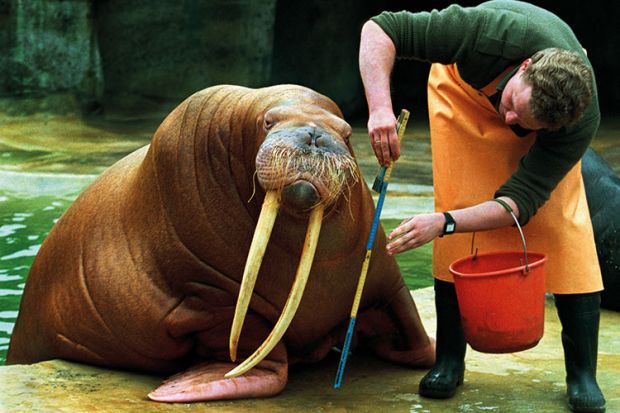Putting teeth into the TEF
“It’s another Poppleton first!”
That was how our vice-chancellor greeted the appointment of Mr Nick Squires as our brand-new Head of Teaching Excellence.
Mr Squires, who boasts a background in the private non‑dom, for‑profit educational measuring sector, told The Poppletonian that he was “excited and honoured” to be at the heart of our university’s submission to the forthcoming TEF (teaching excellence framework).
“What makes the new TEF so very exciting”, he enthused, “is that for the very first time we are going to be able to bring quantitative measurements to bear on an activity that in the past has been judged by very subjective criteria. In the bright new future, instead of commending a lecture for being insightful or authoritative, we will be able to award it points out of a hundred.”
Not that everything about the TEF was straightforward. Mr Squires said that he had particularly noted the recent warning from Quintin McKellar, vice-chancellor of the University of Hertfordshire, that care must be taken in using students’ assessments of teaching excellence as these might misleadingly be based on “how entertained they felt in class”.
It was for this reason that he wished to commend the giant TEF strides that had already been taken by our very own Department of Media and Cultural Studies. “My preliminary findings”, said Mr Squires, “show that no student has ever been remotely entertained by a single lecture emanating from that department. One can only hope that other departments are able to attain such TEF-compatible non-entertaining heights in the near future.”

Poetry please
Our distinguished poet-in-residence, Carol Jane Murphy, has joined other arts-based academics in protesting about the manner in which tuition fees paid by arts students are being used to subsidise undergraduate science courses.
Ms Murphy, whose new collection of very short poems, Burrowings, was recently published in an extraordinarily limited edition by Badger Press, told our reporter Keith Ponting (30) that she was fully aware of the high costs of a science degree. “Obviously, you can’t run a chemistry course without a stock of copper sulphate and a lot of test tubes and retorts and a reasonable supply of litmus paper.”
But she insisted that her own “ground-based” approach to poetry teaching also incurred “very necessary expenditure”. She instanced the cost of providing “good, bubbly red wine” for the St Agnes Eve Party, the expenses involved in hiring a coach to the beginning of the M25 (The Road Not Taken) and in purchasing return train tickets to Stockton-on-Tees (The Waste Land).
In addition, there had been the substantial entrance fees to London Zoo, where students had been able to enhance their poetic understanding by enjoying a first-hand acquaintance with a raven, an albatross, a skylark, a tyger and a Pobble without any toes.
She hoped this now clarified the expenditure situation.
Thought for the week
(contributed by Jennifer Doubleday, Head of Personal Development)
Graduation Day Questions: No 26
Q. Is there anything at all in common among the three pieces of music played by the university orchestra at every graduation ceremony?
A. They are all seriously under-rehearsed.
Register to continue
Why register?
- Registration is free and only takes a moment
- Once registered, you can read 3 articles a month
- Sign up for our newsletter
Subscribe
Or subscribe for unlimited access to:
- Unlimited access to news, views, insights & reviews
- Digital editions
- Digital access to THE’s university and college rankings analysis
Already registered or a current subscriber?
